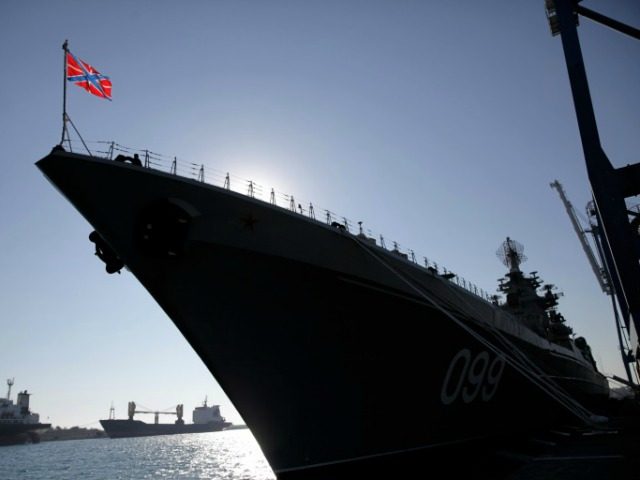The Russian Defense Ministry announced that it is planning to upgrade its naval base in the Syrian port city of Tartus into a permanent facility, a move that comes as the Kremlin has expressed interest in erecting military bases in Latin America and Egypt, as well as reopening Soviet-era facilities in Vietnam and Cuba.
Russia has recently warned the United States it would stop any attempted U.S. strikes in Syria, reports Agence France-Presse (AFP).
“In Syria we will have a permanent naval base in Tartus,” Russian Deputy Defense Minister Nikolai Pankov is quoted by various Russian news agencies as saying, according to AFP.
He pointed out that the plans to construct the permanent base are well underway.
“By doing this Russia is not only increasing its military potential in Syria but in the entire Middle East,” Sen. Igor Morozov, a member of the upper house of Parliament’s International Affairs Committee, told the RIA news agency, according to Reuters.
Citing the Izvestia newspaper, Reuters reports that Moscow was also negotiating opening an air base in Egypt.
On Monday, the Kremlin’s Defense Ministry revealed that Russian paratroopers, in an unprecedented move, would take part in military exercises with their Egyptian counterparts on Egyptian soil this month, adds Reuters.
Last week, the Obama administration suspended talks with Russia about the conflict in Syria, accusing Moscow for the collapse in negotiations and of joining Assad troops in indiscriminately targeting civilians in the besieged city of Aleppo, rather than fighting the Islamic State (ISIS/ISIL).
In turn, Russia has accused the United States of backing rebel group that both Moscow and its ally Assad consider terrorists.
Some members of the Obama administration were expected to recommend that the United States launch airstrikes against Assad. However, President Barack Obama is reportedly unlikely to make such a move.
“At odds with Washington over Syria and Ukraine, Russia has engaged in a bout of saber-rattling in recent weeks, moving S-300 surface-to-air missiles to Tartus, nuclear-capable missiles to its European exclave of Kaliningrad, and reinforcing its Syria strike force,” reports Reuters.
“Leonid Slutsky, a senior [Russian] parliamentarian, told RIA its [Tartus] capacity would be expanded and it would be equipped with anti-submarine defenses and new electronics systems on top of the S-300 missiles it recently received,” notes AFP.
“Moscow also sent three missile ships to reinforce its naval forces off the coast of the conflict-wracked nation,” adds AFP.
U.S. Southern Command (SOUTHCOM), which is in charge of military operations in Latin America and the Caribbean, has expressed concern about Russia’s expanding presence in the Western Hemisphere in an annual report submitted to Congress in recent years, including 2016.
Last week, Russia said it was weighing reopening Soviet-era bases in Vietnam and Cuba.
According to SOUTHCOM, Russia has already established military agreements for “simplified port access and logistical support” with the Central American country of Nicaragua, where it is reportedly considering constructing a base.
Through the state-owned Russia Today (RT) media outlet, SOUTHCOM warns, Moscow is disseminating anti-American propaganda and in some instances fueling the anti-U.S. sentiment that already exists in Ecuador, Argentina, and Venezuela, the last of which is another country where Russia is reportedly looking to construct a base.
Russia also uses its online news and Sputnik Mundo to spread anti-American propaganda targeted at Latin American audiences, adds the U.S. military, noting that “Russia uses this media to create doubts about U.S. intentions and criticize U.S. policies.”
The anti-American government of Venezuela has long refused to cooperate with the United States on combating terrorism and other threats in the region.
Russia and Iran, including the Iranian narco-terrorist proxy Hezbollah, have kept the regime of Syrian Dictator Bashar al-Assad in operation. The U.S. State Department and SOUTHCOM have warned that both Iran and Hezbollah are also operating in Latin America, particularly in Venezuela.
SOUTHCOM reported to lawmakers earlier this year:
In this part of the world [Latin America, Caribbean], Russia’s actions are directly connected to its broader global efforts to demonstrate that Russia is a global power capable of challenging U.S. leadership and the established rules-based international system. Russian officials’ rhetoric, high-level political visits, and military-security engagements are designed to displace the United States as the partner of choice in the region. Over the past year [2015], Russia continued to maintain a presence in Latin America, collecting information about the region and the United States.
In less than a year, starting in mid-2014, the U.S. military noted that Russia made four naval deployments to Nicaragua, the U.S. east coast, and the Caribbean, “all of which involved data or intelligence collection.

COMMENTS
Please let us know if you're having issues with commenting.